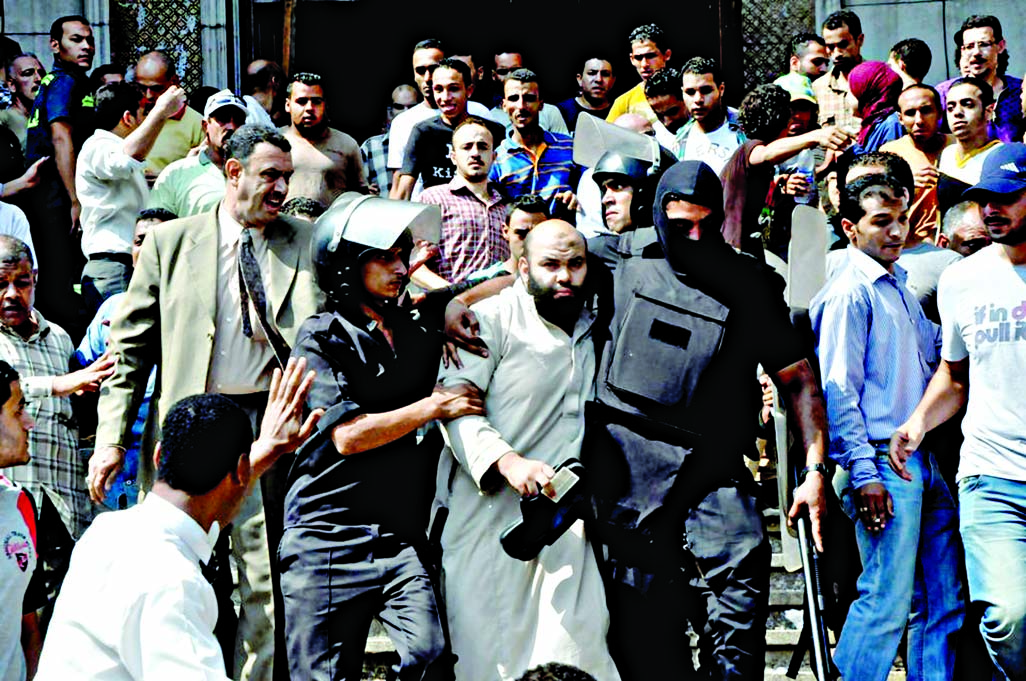News >> World
Cairo mosque cleared after siege
 18 Aug, 2013
18 Aug, 2013
Egypt's security forces have cleared a Cairo mosque after a long stand-off with Muslim Brotherhood supporters barricaded inside, state media says.
All the protesters have now been taken out of the mosque, and many have been arrested, security forces say.
The confrontation at the al-Fath mosque continued for most of the day - with exchanges of gunfire between security forces and protesters.
Meanwhile the interim PM has proposed legally dissolving the Brotherhood.
The group supports the ousted President Mohammed Mursi, and wants him to be reinstated.
Despite being closely allied to Mursi's government, the Brotherhood has always technically been a banned organisation - it was officially dissolved by Egypt's military rulers in 1954 - but it recently registered itself as a non-governmental organisation.
If it was legally dissolved, its property and assets could be seized.
It has called for daily demonstrations since a crackdown on its protest camps in Cairo on Wednesday left hundreds of people dead. Further clashes on Friday killed at least another 173 people.
Egypt's interim Prime Minister Hazem Beblawi believes the protests are "terrorist acts", according to his spokesman, Sharif Shawqi. Shawqi told a televised news conference on Saturday that the Muslim Brotherhood's return to power was impossible.
The stand-off began overnight, when the al-Fath mosque - which was being used as a makeshift clinic for the injured and morgue for the dead from clashes on Friday - turned instead into what correspondents describe as a fortress.
Brotherhood members barricading themselves inside, using anything at their disposal.
It turned into a scene of chaos. Tear gas was fired into the building, and witnesses saw live ammunition fired by both sides. Al-Jazeera television called one woman inside the mosque on her mobile phone as the shooting began.
"Nobody here is safe, they are shooting inside the mosque," she said, with loud firing heard in the background.
Egyptian police have been bringing some Mursi supporters out of the building - leading some, dragging others - but are then having to protect them from angry mobs armed with bats and pieces of wood who are trying to attack them, correspondents say.
The BBC's Bethany Bell in Cairo says the authorities want to secure all buildings to avoid a repeat of Muslim Brotherhood supporters forming more camps, as they did after Mursi was ousted.
Egyptian government spokesman Sharif Shawqi says the protests are "terrorist acts"
Separately, the Egyptian authorities say they have arrested the brother of al-Qaeda chief Ayman al-Zawahiri.
Mohammed al-Zawahiri was detained at a checkpoint in Giza, near Cairo, because of his links to Mursi, according to security officials.
Also on Saturday, the Muslim Brotherhood said on its Facebook page that Ammar Badie, the son of the movement's spiritual leader, General Guide Mohamed Badie, was one of those killed during protests on Friday.
The Brotherhood said that Ammar Badie, 38, had died of a bullet wound in Ramses Square on Friday.
The secretary-general of the Brotherhood's Freedom and Justice Party, Mohammed al-Beltagi, says his 17-year-old daughter, Asmaa, died in earlier protests.
Saturday's violence comes after days of unrest in Cairo and elsewhere in Egypt. The escalation in tensions began on Wednesday, when armoured bulldozers moved into the two Cairo protest camps which had been occupied by pro-Mursi activists since he was ousted on 3 July.
The camps were eventually cleared, but not before at least 638 people were killed.
Mobs later carried out reprisal attacks on government buildings and police stations as well as churches belonging to the country's Coptic Christian minority.
On Friday, hundreds of Muslim Brotherhood supporters gathered in Ramses Square for a "march of anger" about the bloodshed earlier in the week.
At least 173 people died across the country on Friday in clashes between the Brotherhood and the security forces.
Source: new nation

